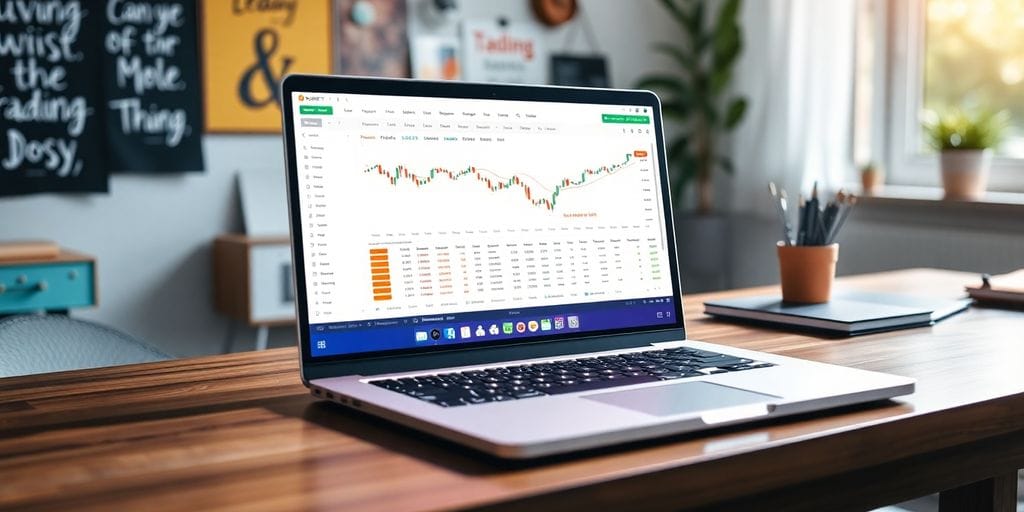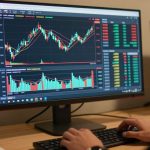If you’re just starting out in day trading, choosing the right platform can feel overwhelming. With so many options out there, it’s crucial to find one that suits your needs as a beginner. In 2025, the best day trading platform for beginners should be user-friendly, offer real-time data, and provide essential tools to help you succeed. In this article, we’ll explore the top platforms and features that make them stand out, so you can start your trading journey with confidence.
Key Takeaways
- Look for platforms with simple interfaces that make trading easy for beginners.
- Real-time market data is essential for making quick decisions.
- Advanced charting tools can help you analyze trends and patterns effectively.
- Consider the costs involved, including commissions and any hidden fees.
- Educational resources and customer support are vital for new traders.
Key Features Of The Best Day Trading Platform For Beginners
When you’re just starting out with day trading, the platform you choose can really make or break your experience. It’s not just about finding something that looks cool; it’s about finding a platform that gives you the tools you need to learn and succeed. Let’s break down some key features to look for.
User-Friendly Interface
The platform should be easy to understand and navigate. You don’t want to spend hours trying to figure out where everything is. A clean, intuitive interface will help you focus on trading, not on learning the software. Look for platforms with customizable layouts so you can set things up in a way that makes sense to you. This is especially important when you’re making quick decisions under pressure.
Real-Time Market Data
Access to real-time market data is non-negotiable. Delayed data can lead to missed opportunities or, worse, bad trades. You need to see what’s happening in the market right now. Many platforms offer real-time data as part of a premium package, but some provide it standard. Make sure the data feed is reliable and updates quickly.
Advanced Charting Tools
Charting tools are essential for technical analysis. You’ll want a platform that offers a variety of chart types, technical indicators, and drawing tools. Being able to spot trends and patterns is a big part of day trading, and good charting tools will help you do that. Look for features like:
- Multiple chart types (candlestick, line, bar)
- A wide range of technical indicators (MACD, RSI, moving averages)
- Customizable timeframes
- Drawing tools for trendlines and support/resistance levels
A good day trading platform should feel like a natural extension of your trading strategy. It should provide the information you need, when you need it, without getting in your way. It’s about finding a balance between functionality and simplicity.
Top Recommendations For New Day Traders
Interactive Brokers Overview
Interactive Brokers is often mentioned as a solid choice, especially if you’re looking for low margin rates and advanced execution. Their Trader Workstation platform can seem a bit complex at first, but it’s packed with features that experienced traders appreciate. It might take some time to get used to it, but the level of control and customization is pretty impressive. They also have pretty competitive pricing, which is always a plus. If you are looking for advanced trading technology, this might be the platform for you.
Webull Features
Webull has gained popularity, especially among those who are comfortable with mobile trading. It’s known for its user-friendly interface and commission-free trading. Here are a few things to consider:
- Mobile Focus: Webull is primarily a mobile platform, so if you prefer trading on your phone, it’s a good fit.
- Commission-Free: They offer commission-free trading on stocks, ETFs, and options.
- Fractional Shares: You can buy fractional shares, which is great if you’re starting with a smaller amount of money.
Webull’s simplicity can be a double-edged sword. While it’s easy to use, it might lack some of the advanced tools and research resources that more experienced traders need. It’s a good starting point, but you might outgrow it as you become more proficient.
Fidelity Investment Insights
Fidelity is a well-established brokerage firm with a strong reputation for research and customer service. They also have a platform called Active Trader Pro, which is designed for more active traders. Fidelity is known for execution quality and trader support. Here’s what makes Fidelity stand out:
- Research Resources: Fidelity offers a wealth of research and analysis tools.
- Active Trader Pro: Their Active Trader Pro platform is robust and customizable.
- Customer Support: Fidelity is known for its excellent customer service. They also offer virtual trading accounts to test strategies.
Fidelity is a good choice if you value research, support, and a solid, reliable platform. It might not be the flashiest option, but it’s a dependable choice for new traders.
Understanding Trading Costs And Fees
It’s easy to get caught up in the excitement of day trading, but you need to understand all the costs involved. Don’t just look at the price of a stock; consider the fees that can eat into your profits. Ignoring these costs is a quick way to lose money, even if your trades are technically "successful".
Commission Structures
Commission structures vary a lot between brokers. Some offer commission-free trading for stocks and ETFs, which sounds great, but they might make up for it elsewhere. Others charge a small fee per trade. For example, Self-Directed Trading might advertise commission-free trades, but options contracts could have a per-contract fee. It’s important to understand how your broker charges for different asset classes like stocks, options, and futures. Here’s a quick comparison:
| Broker | Stock Trades | Options (per contract) | Futures (per contract) |
|---|---|---|---|
| Broker A | $0.00 | $0.65 | $1.50 |
| Broker B | $0.00 | $1.00 (capped) | $2.50 |
Hidden Fees To Watch For
Beyond commissions, watch out for hidden fees. These can include account maintenance fees, inactivity fees, and data fees. Some brokers charge for real-time market data, which is pretty important for day trading. Also, be aware of wire transfer fees if you need to move money in or out of your account. Always read the fine print and understand all the potential costs. Here are some fees to keep an eye on:
- Inactivity fees
- Data fees
- Wire transfer fees
- Account maintenance fees
It’s easy to overlook these smaller charges, but they can add up quickly, especially if you’re making a lot of trades. Make sure you factor them into your trading strategy.
Cost-Effective Trading Strategies
To keep costs down, think about your trading style. If you’re a high-frequency trader, commission-free platforms can save you a lot. But if you trade less often, a broker with slightly higher commissions but better tools might be worth it. Also, consider using limit orders to avoid unexpected price slippage, which can add to your costs. Choosing the right day trading platform is important. Here are some strategies to consider:
- Use limit orders.
- Consolidate trades when possible.
- Choose a broker that matches your trading style.
Essential Tools For Successful Day Trading

Day trading isn’t just about picking stocks; it’s about having the right gear. Think of it like a race car driver – they need a fast car, but also a great pit crew and real-time data. The tools you use can seriously impact your success.
Technical Analysis Software
Technical analysis software is your command center. It’s where you’ll spend a lot of your time, so picking the right one is important. Look for these features:
- Customizable Charts: Being able to tweak charts to show the data you care about is key.
- Real-Time Data Feeds: Delayed data is useless. You need to see what’s happening now.
- Drawing Tools: Lines, shapes, annotations – these help you spot patterns.
Technical analysis software helps traders examine past market data, such as price and volume, to identify patterns and trends. These insights can inform trading decisions, helping traders predict future price movements and manage risk more effectively.
Risk Management Tools
Risk management is boring, until it saves you from losing everything. These tools help you stay in the game:
- Stop-Loss Orders: Automatically exit a trade if it goes against you.
- Position Sizing Calculators: Figure out how much to trade based on your risk tolerance.
- Alerts: Get notified when a stock hits a certain price or volume level.
News and Research Resources
Staying informed is half the battle. You need access to reliable news and research to understand what’s moving the markets. Here’s what to look for:
- Real-Time News Feeds: Breaking news can cause big price swings.
- Analyst Ratings: See what the pros think about a stock.
- Economic Calendars: Know when important economic data is being released.
Here’s a quick comparison of some popular resources:
| Resource | News Quality | Research Depth | Real-Time Data | Cost |
|---|---|---|---|---|
| Bloomberg | High | High | Yes | Expensive |
| Reuters | High | Moderate | Yes | Moderate |
| Yahoo Finance | Moderate | Low | Yes | Free |
| Google Finance | Moderate | Low | Yes | Free |
Having the right trading platform is just as important as having a solid strategy. Don’t skimp on the tools!
Mobile Trading Experience For Beginners
Mobile trading has become super important for new day traders. It lets you keep an eye on the market and make trades from pretty much anywhere. But, not all mobile platforms are created equal. It’s important to find one that fits your needs as a beginner.
Best Mobile Apps For Day Trading
Okay, so which apps are actually good for day trading when you’re just starting out? A few names pop up consistently. For example, Robinhood is known for its simple interface and commission-free trading, which can be appealing if you’re watching every penny. Webull is another popular choice, offering similar features plus some basic charting tools. Fidelity also has a solid mobile app, especially if you already have other accounts with them. ETRADE also offers two levels of mobile trading apps. The more advanced, Power ETRADE app is well suited for day trading. It is packed with useful tools, such as Behind the Move, which highlights stocks moving and explains reasons for price moves. The app also provides interactive charts, streaming real-time quotes, over 100 technical studies and much more.
Here’s a quick comparison of some popular apps:
| App | Key Features | Fees | Ease of Use |
|---|---|---|---|
| Robinhood | Simple interface, commission-free trading | None | Very Easy |
| Webull | Commission-free, basic charting | None | Easy |
| Fidelity | Research tools, integrated accounts | Commission-free for stocks | Moderate |
Features To Look For In Mobile Platforms
When you’re checking out mobile trading platforms, there are a few things you should keep in mind. First, make sure the app is easy to use. You don’t want to be fumbling around when you need to make a quick trade. Real-time data is also a must-have. You need to see what’s happening in the market right now, not 15 minutes ago. Charting tools are important too, even if they’re basic. Being able to see price trends can help you make better decisions. Also, look for platforms that offer alerts and notifications, so you don’t miss important market movements. Finally, check if the app offers paper trading, which allows beginners to test strategies without risking real capital.
Here’s a list of features to consider:
- User-friendly interface
- Real-time market data
- Basic charting tools
- Alerts and notifications
- Paper trading
User Reviews And Ratings
Don’t just take the platform’s word for it – see what other users are saying. Check out the app store reviews and ratings. Look for common complaints or praises. Are people saying the app is buggy? Is the customer support helpful? Do people find it easy to use? User reviews can give you a good idea of what to expect. Also, keep in mind that everyone’s experience is different, so take the reviews with a grain of salt. But, if you see a lot of people saying the same thing, it’s probably worth paying attention to. For beginner day traders, Fidelity is a great choice. The platform is intuitive, easy to customize, and designed to help new traders navigate the fast-paced world of active trading.
It’s easy to get caught up in the excitement of mobile trading, but remember to stay disciplined. Don’t make impulsive decisions just because you can trade from your phone. Stick to your trading plan and manage your risk carefully.
Educational Resources For New Traders

It’s easy to get lost when you’re starting out. Luckily, there are tons of resources to help you learn the ropes. Let’s look at some of the best ways to get educated.
Online Courses And Webinars
Online courses and webinars are a great way to learn at your own pace. Many brokers offer free educational content, and there are also paid courses that go into more depth. Look for courses that cover the basics of trading, technical analysis, and risk management. Webinars can be a good way to stay up-to-date on current market trends and strategies. For example, some top day trading courses offer expert guidance and community support.
Trading Simulators
Trading simulators, also known as paper trading accounts, let you practice trading without risking real money. This is super important for beginners. You can test different strategies, get used to the trading platform, and learn from your mistakes without losing capital. Most brokers offer a platform that offers paper trading, so take advantage of it. It’s like a flight simulator for trading – you can crash and burn without any real-world consequences.
Community Forums And Support
Don’t underestimate the power of community. Trading forums and online communities can be a great place to ask questions, share ideas, and learn from other traders. Look for forums that are active and have a good reputation. Be careful about taking advice from strangers online, but it can be helpful to see how other people are approaching the market. Some brokers even offer their own community forums, which can be a good place to connect with other users of the platform.
It’s important to remember that education is an ongoing process. The market is constantly changing, so you need to keep learning and adapting your strategies. Don’t be afraid to ask questions, experiment, and learn from your mistakes. The more you learn, the better your chances of success.
Evaluating Customer Support And Service
It’s easy to overlook customer support when you’re picking a day trading platform, but trust me, you don’t want to. When things go wrong – and they will – you’ll be thankful you chose a platform with solid support. Think about it: you’re in the middle of a trade, something glitches, and you need help now. A slow or unhelpful support team can cost you real money.
Availability Of Support Channels
First off, what ways can you even reach the support team? Is it just email, or do they have phone support? What about live chat? The more options, the better, especially if you need help fast. Some platforms are starting to use AI chatbots, but honestly, those can be hit or miss. I prefer talking to a real person, especially when it involves money. Here’s a quick rundown of what to look for:
- Phone Support: Ideal for urgent issues.
- Live Chat: Great for quick questions.
- Email: Okay for less urgent stuff, but response times can vary.
- FAQ/Help Center: Should be comprehensive and easy to search.
Response Times
Okay, so they have support channels, but how long does it actually take to get a response? This is huge. If you’re waiting hours for an email reply while your trade is tanking, that’s a problem. Look for platforms that advertise quick response times, especially for phone and chat support. Some brokers even publish their average response times, which is a good sign.
I remember one time I was using a platform and had an issue with an order. I tried contacting support through their live chat, and it took them almost an hour to respond! By that time, the trade had already gone south, and I missed out on a good profit. Ever since then, I always check the response times before choosing a platform.
User Feedback On Support
What are other traders saying about the support? Check out reviews and forums to see what people’s experiences have been. Are they generally happy with the support, or are there a lot of complaints about slow responses or unhelpful agents? Pay attention to trends – if you see a lot of people saying the same thing, it’s probably true. Don’t just look at the star ratings; read the actual comments to get a better sense of what to expect. You can also check out ratings from expert Nerds investment account providers to get a better idea of the quality of support.
Final Thoughts on Choosing Your Day Trading Platform
So, there you have it. Picking the right day trading platform in 2025 doesn’t have to be a headache. With so many options out there, you can find one that fits your style and needs. Whether you want something simple or a platform packed with features, there’s something for everyone. Just remember to take your time, do your homework, and maybe even try a few out before settling on one. Happy trading!
Frequently Asked Questions
What is the best platform for beginners in day trading?
For beginners, the best day trading platform is often Webull or Fidelity. They have easy-to-use features and helpful tools.
Are there any fees for using day trading platforms?
Yes, many platforms have fees, but some like Webull offer zero commissions for trades, which is great for beginners.
How can I learn day trading?
You can learn day trading through online courses, webinars, and by using trading simulators that let you practice without real money.
What tools do I need for day trading?
Essential tools include charting software to analyze stocks, risk management tools to protect your money, and news resources to stay updated.
Is mobile trading good for beginners?
Yes, mobile trading is very convenient for beginners. Many platforms have apps that make it easy to trade on the go.
How important is customer support for trading platforms?
Customer support is very important. You want to be able to get help quickly if you have questions or issues while trading.










